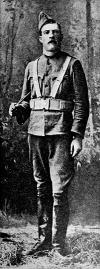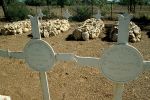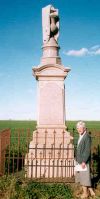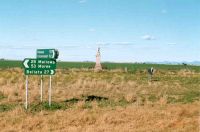Biography – Trooper James Daniel Duff
Regimental No 34, 'A' Squadron NSW Bushmen's Contingent
James Daniel Duff, son of James and Catherine Duff, was born on 3 October 1875 at Tringha, NSW.1 His father was a well-known resident having spent forty years in the rural district of Millie, some 60 kilometres north-west of Narrabri. James and his brother, Eric, enlisted with the NSW Bushmen's Contingent and prior to their departure from home, were given a banquet by the residents of Millie. On that occasion each of them was presented with a gold medal and a purse of sovereigns.2 The Duff brothers sailed with the contingent on 28 February 1900, arrived in Capetown on 2 April and then proceeded via Marandelles to Bulawayo, Rhodesia (Zimbabwe).
'A' Squadron served under General Plummer in the engagements at Mafeking and Rustenburg. Then the squadron, assisted by about 50 men of other details, defended Eland's River for 13 days refusing to surrender on any terms, against the Boer commander De la Rey with 1,000 men and guns. They were eventually relieved by Lord Kitchener’s force on 15th August, and Lord Methuen's column which arrived from the north on 18th August, 19003 However, James Duff, considered to be one of the most accomplished horsemen in the contingent, was killed on 4 August 1900 by a shell wound to the chest during the battle at Elands River.
The Rev James Green wrote of Elands River:
We had 32 casualties for this day, five of which were deaths. One of the saddest processions imaginable was the burial party which followed me at midnight, outside the camp, to the place pitched on as our cemetery, where we were to bury our comrades. When the flag was removed from the bodies it was a strange sight which met our eyes. Some of the dead looked almost alive, – they lay there in the attitude assumed at the moment of falling. A gunner lay with his knee drawn up, his hand outstretched and eyes fixed, as though death had come to him at the very moment when he had located the enemy's gun, and was eagerly pointing it out to his comrades. We buried them there, near the position they died to hold, whilst the silent and statuesque sentry at the foot of the grave stood at attention.4
Although Duff was buried on the day of his death his burial service was not held until two weeks later. Heavy Boer fire prevented the service from happening until the arrival of Kitchener's relief column. On 17 August, the Rev James Green read the burial service over the graves of Troopers James Duff, John Waddell, James Walker and Sergeant Major James Mitchell. A single piece of slate served as a headstone for the four Australians.
In January 1901, after lengthy debate as to the type of memorial that should be erected to Duff's memory, an impressive memorial was unveiled in his hometown of Millie, New South Wales. A crowd of some 300 visitors, gathered to see Mr T H Hassall, Minister for Lands, accompanied by parliamentary colleagues, perform the task. Flags were artistically arranged and the veil, which covered the inscription, featured the fallen soldier’s initials J D D and the words 'He did his duty'. The monument of Peterhead granite stood twenty feet high, with the inscription –
In memory of
JAMES DANIEL DUFF
Trooper, Australian Bushmen's Contingent
Killed in action at Elands River,
South Africa, 4th August 1900
Aged 25 years
'
The Lord knoweth them that are His'
This monument has been erected by the residents of
Millie and district, in grateful recognition
of valuable service rendered to Queen
and country. 5
A reporter from the Sydney Mail wrote:
The sight of the unveiling was very impressive and no doubt this beautiful monument, standing out, as it does with the lonely plain in the background, will stand for hundreds of years and stir the heart of many a young man who will view it.6
The original headstone of slate that stood over the graves of Duff and his three fellow Bushmen is now on display in the Australians in South Africa gallery at the Australian War Memorial, Canberra. A number of years ago, four individual metal crosses replaced this headstone, which was then brought to Australia. Today the only vestige of the town of Millie is the memorial to Trooper Duff, silhouetted against the plain.
Acknowledgement – Nance and Bill Richards, Narrabri Historical Society.
1 Nominal Roll, NSW Citizens Bushmen, B2504 2A National Archives of Australia.
2 The Late Trooper J D Duff, Australian Town and Country Journal, 1 September 1900.
3 Official Records of the Australian Military Contingents to the War in South Africa, P L Murray, Melbourne 1911.
4 The Story of the Australian Bushmen (being notes of a Chaplain), James Green, Sydney, 1903.
5 Narrabri in Wartime – The Boer War, Peter Miller.
6 Unveiling a War Monument at Millie, Sydney Mail, 2 February 1901.







